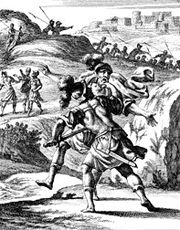Amasa

Amasa (עמשא) or Amessai[1] is a person mentioned in the Hebrew Bible. His mother was Abigail (2 Samuel 17:25), a sister of King David (1 Chronicles 2:16,17). Hence, Amasa was a nephew of David, and cousin of Joab, David's military commander, as well as a cousin of Absalom, David's son. David calls him "my bone and my flesh" (2 Samuel 19:13). Amasa's father was Jether (1 Kings 2:5,32, 1 Chronicles 2:17) who was also called Ithra (2 Samuel 17:25). Jether had dual-nationality, being an Ishmaelite and Israelite, although it might be a case of an assimilated Ishmaelite living in Israel. [2]
When Absalom rebelled against David and won over the tribes of Israel (2 Samuel 15), he appointed Amasa as commander over the army (2 Samuel 17:25), in effect replacing Joab, who had served as commander for David.
After the revolt was crushed and Absalom died (2 Samuel 18:1–17), David was invited back to Jerusalem and restored as king. David re-appointed Amasa "from now on" as his military commander (2 Samuel 19:13) in place of Joab. The New International Version translates the Hebrew text as commander "for life".[3]
David's appointment of Amasa has been interpreted as "a bold stroke of policy, to promise the post of commander-in chief to the general of the rebel army".[4]
While being fiercely loyal to David, Joab was also suspicious of any potential rivals for Joab's power or threats to David's kingdom, and had no qualms about taking the lives of any who might stand in his way (e.g., Abner: 2 Sam 3:27, and Absalom: 2 Sam 18:14). So it was not difficult for Joab to also decide to murder Amasa (2 Sam 20:10, 1 Kgs 2:5,32). Joab's own justification for killing Amasa may have been because he believed Amasa to be conspiring with Sheba son of Bichri the Benjamite, due to Amasa's slowness to mobilize the army against Sheba's rebels (2 Sam 20:4,5).
References
[edit]- ^ Brenton's Septuagint Translation, 2 Samuel 19:13
- ^ "1 Chronicles 2 Benson Commentary". Biblehub.com. 2024. Archived from the original on March 5, 2024.
- ^ 2 Samuel 19:13 NIV translation
- ^ Kirkpatrick, A., Cambridge Bible for Schools and Colleges on 2 Samuel 19, accessed 13 August 2017
Text is available under the CC BY-SA 4.0 license; additional terms may apply.
Images, videos and audio are available under their respective licenses.
